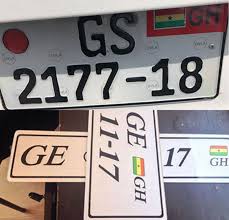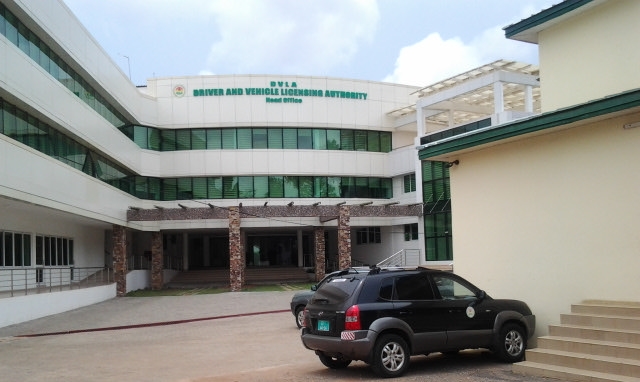The Driver and Vehicle Licensing Authority (DVLA) is planning to enact extensive reforms, including a drastic overhaul of the country’s number plate system, in an audacious attempt to modernise vehicle registration, improve security, and maximise revenue collection.
These ambitious plans, which were unveiled by Julius Neequaye Kotey, the Acting Chief Executive Officer of the DVLA, highlighted their potential to streamline road user charges and curb the illicit vehicle trade, particularly the widespread problem of “Togo cars“—a collective term for vehicles entering Ghana without proper duty payment.
The suggested modifications represent a substantial advancement toward a vehicle management system that is more transparent and technologically sophisticated.
“We want to bring in plastic with a chip embedded in it, and that is what we are trying to put in place to do away with the Togo cars.”
Julius Neequaye Kotey, the Acting Chief Executive Officer of the DVLA
This technological upgrade is envisioned as a powerful deterrent against the illicit importation and fraudulent registration of vehicles that circumvent customs duties.
The embedded chip will serve as a digital identifier, holding comprehensive information about the vehicle, which can be instantly accessed by law enforcement. Mr. Kotey explained, illustrating the real-time data retrieval capability that will empower police and other authorities.
This rapid information access is crucial for crime prevention and investigation, making it significantly harder for criminals to evade identification after using vehicles in illicit activities.

Enhancing Integration
Beyond law enforcement, the new smart number plates are designed to integrate seamlessly with future road user charging systems. Mr. Kotey revealed that the DVLA is exploring mechanisms where the chipped plates can communicate directly with road toll systems.
This foresight aligns with ongoing discussions about replacing traditional toll booths with more efficient, digital alternatives.
“Because it’s highly possible that DVLA will not be taking the road toll. So we are looking at a plate that can communicate with the road toll system so that we also use it.”
Julius Neequaye Kotey, the Acting Chief Executive Officer of the DVLA
This strategic alignment aims to create a unified and technologically advanced infrastructure for both vehicle identification and revenue collection.
The discussion then naturally pivoted to the contentious issue of road tolls. Mr. Kotey acknowledged the ongoing proposals to eliminate physical toll booths and instead introduce a “road facility user fee paid annually,” calculated based on the initial population of vehicles in the country.
This suggestion, spearheaded by stakeholders, aims to eliminate the challenges with the toll booth and ensure efficient revenue collection.
He confirmed that a dedicated committee, comprising representatives from the Ministry of Transport and the Ministry of Roads, is diligently working on this complex issue, exploring various implementation models.

Among the options being considered for road user fees, some advocate for a fully digital device system, where vehicles simply “pass through, and then it captures it and withdraws from your Momo” (mobile money). This touchless system promises unparalleled efficiency and convenience.
Another proposition suggests integrating the fee into the annual roadworthy certificate payment: “When you go and do your roadworthy certificate, then you pay,” he said.
However, Mr. Kotey quickly highlighted a critical challenge that necessitates the comprehensive number plate reform. He exposed a pervasive issue where “some of the cars on our roads are using fake roadworthy because they have fake number plates.”
This deeply ingrained problem, he asserted, stems from the illicit trade of “Togo cars,” where vehicles enter the country without paying duty, often by exploiting “eco protocols” or other loopholes.
According to him, once in Ghana, these illegally imported cars are then fitted with fraudulent number plates, sometimes by altering genuine accident car numbers, leading to “duplicity of numbers” as previously identified by officials of the DVLA.
Rooting out Criminal Enterprise
According to the Acting CEO, the DVLA’s new system directly targets this criminal enterprise by making it virtually impossible to create and use fake number plates, insisting that the complexity of the current system extends beyond fake plates to fraudulent documentation.
Mr. Kotey revealed that some individuals collaborating with customs officers provide “fake, and, duty, numbers, documents to use.” This collusion at various levels exacerbates the problem of illegal vehicle registration and tax evasion.
He painted a stark picture of the scale of the challenge: “And we have 25 illegal roads by which we bring cars to this country illegally.” This staggering number of illicit entry points underscores the formidable task facing the authorities in regulating vehicle importation and ensuring compliance.

Recognising the monumental nature of these challenges, Mr. Kotey concluded his remarks with a heartfelt appeal to the Ghanaian populace to support President Mahama’s reset agenda.
“All I’m asking is that Ghanaians should pray for President John Dramani Mahama because we will surely solve these issues,” he said. This expression of confidence, coupled with a call for national support, emphasises the government’s determination to tackle these deeply entrenched problems.
The proposed reforms by the DVLA, particularly the shift to smart number plates, represent a fundamental restructuring of how vehicles are identified, monitored, and regulated in Ghana, with profound implications for national security, revenue generation, and the integrity of the transportation sector.
The success of these initiatives will be a critical step towards a more ordered and economically robust Ghana.
READ ALSO: Kotoko Presents FA Cup Trophy to Otumfuo



















